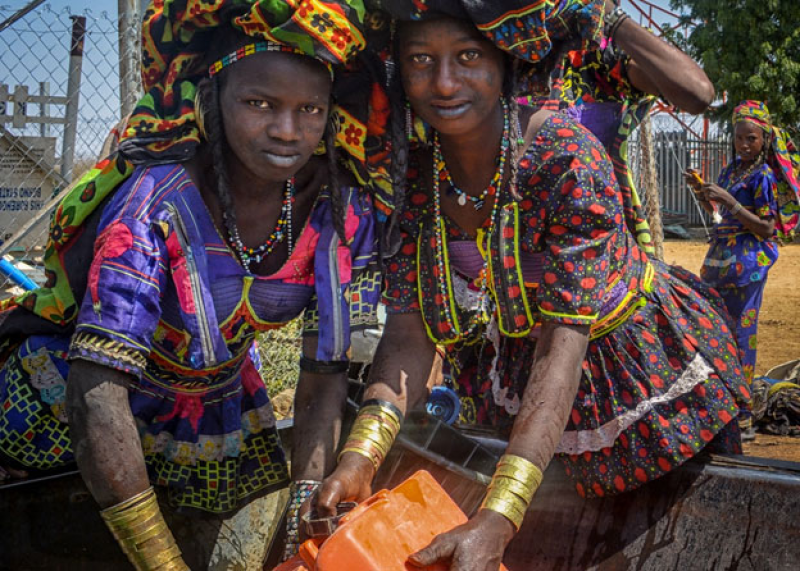- Dhaka’s air ‘unhealthy for sensitive groups’ Wednesday morning |
- US proposes that the UN authorize a Gaza stabilization force for 2 years |
- Democrat Zohran Mamdani is elected New York City mayor |
- Martyr Mugdha's brother Snigdha steps into politics with BNP |
- FAO Warns of ‘Silent Crisis’ as Land Loss Threatens Billions |
Women’s Leadership Key to Building Disaster Resilience

Disasters touch everyone but are not felt equally. Women often take longer to rebuild their livelihoods after a crisis and may face additional barriers in accessing the resources to facilitate a quicker recovery.
Climate and environmental challenges are striking harder and more frequently, reshaping lives across the world. While disasters affect everyone, their impacts are not felt equally. The most marginalised—especially women and girls—are often the first to suffer and the last to recover.
Social roles, discrimination, and economic inequalities amplify the risks women face during crises and weaken communities’ ability to rebuild their livelihoods. Placing gender equality at the heart of disaster risk reduction (DRR) is not only a matter of fairness but a key to a more resilient future for all.
The UNDP is working with partners to turn this vision into action by advancing equality and inclusion at every stage of disaster risk reduction—from preparedness to response and recovery. Drawing on its experience, the UNDP highlights five powerful ways women’s leadership and meaningful participation can strengthen communities’ resilience.
Women’s Leadership Strengthens Resilience
At UNDP, women are encouraged to shape decisions and policies at all levels, from local committees to national platforms. Their expertise and innovation are vital to building resilience.
In Bosnia and Herzegovina, the Feminist Coalition for Climate Justice—supported by UNDP—has improved working conditions for over 75,000 women, trained 1,500 women officials in energy and climate management, and opened new opportunities for women-led enterprises.
In Chad, with support from France through the Global Women, Peace and Security Initiative, women’s cooperatives have combined climate-smart agriculture, solar irrigation, and early warning systems to reduce flood risks and aid recovery—showing how women-led approaches strengthen risk reduction, preparedness, livelihoods, and peacebuilding, even in fragile settings.
Resilience Relies on Care
Resilience depends on care, and women shoulder more than three-quarters of the world’s unpaid caregiving—supporting children, older adults, people with disabilities, and entire communities. During crises, these responsibilities grow as disasters disrupt schools, health systems, and basic services, increasing the burden on women.
Recognising and prioritising care in disaster management—through early warning systems, safe spaces, and continuity of essential services—helps protect lives and accelerates recovery for everyone.
UNDP supports countries in integrating care into disaster and climate strategies. In Honduras, Cuba, Belize, and Guatemala, a geo-referenced care mapping tool helps identify gaps in childcare, eldercare, and disability-inclusive services. In Honduras, this analysis pinpointed “care deserts” in flood- and landslide-prone areas, helping authorities improve safe spaces and include care continuity in evacuation and rehabilitation plans.
In Ukraine, the “Mommy in the Shelter” initiative transformed a basement into a child-friendly refuge during air raids, linking early warning systems with maternal and childcare support, even amid conflict.
Gender Data Enables Better Planning and Response
Good planning begins with good data. Without information disaggregated by sex, age, and disability, disaster risk reduction policies can overlook the unique needs and strengths of different community members. High-quality gender-disaggregated data ensures that strategies are targeted, effective, and inclusive.
Last year, UNDP expanded the use of gender analysis and sex-disaggregated data in 20 crisis-affected countries. Nations such as Cuba, Indonesia, Maldives, Myanmar, Samoa, and Yemen developed early warning systems that enhance women’s engagement and leadership.
In Ethiopia, DRR measures supported women-headed households to recover from landslides, while in Armenia, inclusive risk assessments led by women directly shaped local development and recovery plans.
Institutions with Gender Capacity Build Resilience
Resilient communities depend on resilient institutions. When organisations—from national authorities to local committees—embed gender perspectives into their policy, planning, and programming, good intentions translate into real progress.
Guatemala’s national disaster risk management authority set a new benchmark by earning UNDP’s Gender Equality Seal for Public Institutions. Gender mandates, data, and participation, including that of Indigenous women, are now integrated into local risk management—making institutions stronger and more responsive.
Breaking Down Barriers, Building Resilience
Despite progress, gender equality remains sidelined in many disaster, climate, humanitarian, and development efforts. To change this, women’s leadership, care, and inclusion must be placed at the centre of every plan and policy.
Together, we can:
Make women’s leadership non-negotiable in DRR decision-making and financing.
Channel more capital towards women’s resilience through risk financing, social protection, and support for women-led enterprises.
Integrate care into preparedness and continuity plans to protect caregivers, children, older persons, and persons with disabilities.
Strengthen institutional capacity to apply a gender lens in risk management—from prevention to recovery.
When these measures are consistently implemented, communities worldwide will be better prepared to face challenges and bounce back stronger.
(By Raquel Lagunas, Global Director of Gender Equality, UNDP; and Ronald Jackson, Head of Disaster Risk Reduction and Recovery for Building Resilience, UNDP.)

